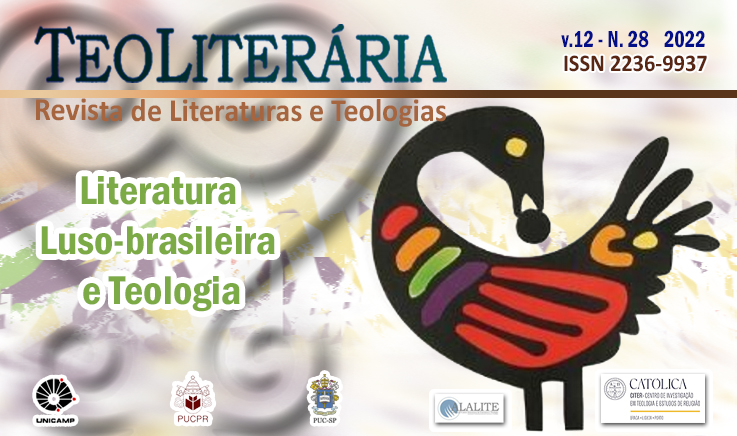Liberdade e responsabilidade da pessoa.
A influência da obra “Fausto” de Goethe em Edith Stein
DOI:
https://doi.org/10.23925/2236-9937.2022v28p272-293Palavras-chave:
Liberdade, Responsabilidade, “Fausto” de Goethe, Edith Stein, Estrutura ônticaResumo
Liberdade e responsabilidade são dois conceitos que devem ser percebidos em todas as suas delicadezas e densidades. O ser humano toma para si a compreensão de liberdade e, em algumas vezes, é a compreensão que lhe convém, isto é, pensa em si mesmo apenas em sua individualização e acaba por deixar de lado a coletividade em que está imerso. Nessa dimensão, Edith Stein trata ambas destas questões a partir de uma perspectiva que possibilita analisar a estrutura ôntica do ser humano, bem como a inserção da especificidade da graça que dialoga diretamente com a liberdade do indivíduo, percebida também, como dom gratuito de Deus. Assim, a liberdade do ser humano infere direta e indiretamente no “eu” e no “outro” e, consequentemente, é de sua responsabilidade tais inferências. A partir desta perspectiva, Stein deixa-se influenciar pela clássico alemão “Fausto” de Goethe uma vez que, a obra traz a narrativa que dialoga inteiramente com a relação existente entre liberdade e responsabilidade, ambas tanto na perspectiva individual quanto na de outrem. Assim, através da obra de Goethe é possível buscar uma fundamentação teórica, filosófica e teológica, acerca da estrutura ôntica da pessoa na percepção de Stein.
Referências
HEISE. ELOÁ di Pierro. Fausto: a busca pelo absoluto, 2001. Disponível em: https://revistacult.uol.com.br/home/fausto-a-busca-pelo-absoluto/ . Acesso em 25 fev. 2022.
HEISE. ELOÁ di Pierro. Literatura Universal – Fausto (JohannGoethe). UNIVESP. Disponível em: https://www.youtube.com/watch?v=1xOc4bPFY0Q Acesso em 07 de abril. 2022.
HEISE, Eloá di Pierro. A lenda do Dr. Fausto em relação dialética com a utopia. In: A literatura da virada do século: fim das utopias? São Paulo: Humanitas. FAPESP, EFLCH/USP, 2001.
GOETHE. Johann Wolfgang von. Fausto Uma tragédia: primeira parte. 7. ed. São Paulo – SP: Editora 34, 2020. 551 p.
GOETHE. Johann Wolfgang von. Fausto Uma tragédia: segunda parte. 6. ed. São Paulo – SP: Editora 34, 2020. 1086 p.
KUSANO. Mariana Bar. A Antropologia de Edith Stein: Entre Deus e a Filosofia. 2. reimpressão. São Paulo – SP: Editora Ideias & Letras, 2014. 149 p.
ROCHA. Magna Celi Mendes da. O Sentido de Formação em Edith Stein: fundamento teórico para uma educação integral. 2014, 155 f. Dissertação (Doutorado) – Pontifícia Universidade Católica de São Paulo, Programa de Pós-graduação em Educação: Psicologia da Educação, 2014. Orientação: Mitsuko Aparecida Makino Antunes. Disponível em: https://tede2.pucsp.br/handle/handle/16137. Acesso em: 07 abr. 2022.
STEIN, Edith. La struttura ontica della persona e la problematica della sua conoscenza. In: STEIN, Edith. Natura, persona, mistica: per una ricerca cristiana della verità. 2. ed. Trad. Barbara Venturi. Roma: Città Nuova, 1999. p. 49-113.
STEIN. Edith. La struttura della persona umana: Corso di antropologia filosofica. Traduzione dal tedesco: Michele D’Ambra. Roma: Città Nuova Editrice, 2013. 245 p.
STEIN, Edith. Obras Completas. Vol. II. Escritos filosóficos: etapa fenomenológica: 1915-1920. Tradução do Alemão de Constantino Ruiz Garrido, José Luis Callero Boro. Madrid: Monte Carmelo, 2005.
Publicado
Como Citar
Edição
Seção
Licença
Copyright (c) 2022 TEOLITERARIA - Revista de Literaturas e Teologias

Este trabalho está licenciado sob uma licença Creative Commons Attribution 4.0 International License.
A TeoLiterária – Revista de Literaturas e Teologias é detentora dos direitos autorais de todos os artigos publicados por ela. A reprodução total dos textos em outras publicações, ou para qualquer outro fim, por quaisquer meios, requer autorização por escrito do editor. Reproduções parciais de artigos (resumo, abstract, mais de 500 palavras de texto, tabelas, figuras e outras ilustrações) deverão ter permissão por escrito do editor e dos autores.



